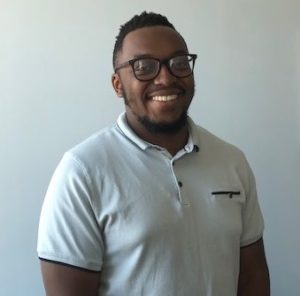Gregory A. Davis, Associate, brings to his work at Fairmount a deep focus on social justice and community development, which has been a through-line across his academic and professional experiences. His research- and writing-focused projects draw on his past work in grantwriting and grants management, and in the public sector. Greg holds a B.S. in Community and Regional Development from Temple University.
 FV: You’ve got a passionate commitment to social equity and community development. Tell us more about what drives those interests.
FV: You’ve got a passionate commitment to social equity and community development. Tell us more about what drives those interests.
GD: My passion and interest stems from regularly seeing a need or a problem in society that requires a well-developed solution. As a native resident, I’ve noticed the reoccurring issue of lack of investment in too many long-time Philadelphians and their communities. While many people have made personal and professional investments to benefit the city, there are still others with continuous lack of access to education, job training, food security, creativity development, housing, etc. – a lingering injustice which community development work often illuminates. As an Associate at Fairmount, I am able to work behind the scenes with local nonprofits who are focused on creating programs which address employment, creative expression, and nutrition, among other needs, and are making the necessary investments that Philadelphia and its residents need to thrive.
FV: Fairmount is your second professional consulting experience. What are a few important qualities that you bring to a nonprofit consulting role?
GD: Knowing the importance of time and DEADLINES. Whether it’s set as “hard” or “soft”, it was set for a reason, so someone or something is depending on that deadline being met. In my career I have quickly realized that deadlines are generally a critical point during a multi-step process. By staying true to your word and to the deadline, a project or idea in time will become whole. I believe the key to success is don’t waste anyone’s time, and rarely miss a deadline.
FV: You interned at City Council during college. What did you learn about the inner workings of city government that can help local nonprofits as they engage with the public sector?
GD: I learned that everyone has a voice that needs to be heard. I am a strong believer in local government because it can affect a person’s day-to-day life much more than a State or Federal agency can. Therefore, the pipeline of contact between the city, community organizations, and constituents must remain clear and constant. In City Council I learned that even though there is power in numbers, anyone’s opinion will be heard and even the smallest of nonprofits can effect a change.
FV: What does a typical day at the office look like?
GD: Every day will be jam-packed with work that will help our clients advance their organization’s mission, but the tasks will be different and require a certain or unique form of thought. It is really is true that no project is the same. Even though the approach may be consistent, the information and the end goal is different, and the mindset I approached yesterday with might not work or be the most efficient today. In terms of office life, we work hard, but we aren’t robots! A nice conversation with a colleague is among the highlights of my workday.
FV: As a Philly native, what are some of your must-see/must-do recommendations for people newer to the city?
GD: Philly’s art and music scene is underrated, overlooked, and slept on as a whole. Artists put an extraordinary amount effort into their craft and it truly does show in Philadelphia. On any given day you can walk down a block in the city and hear one artist performing a folk song, another artist singing a RnB cover, and then look up and see a freshly painted Philadelphia Mural Arts piece. Philadelphia’s art and music scene is second to none, and I recommend any person who lives in or is a visitor of Philadelphia explore what the city has to offer.
